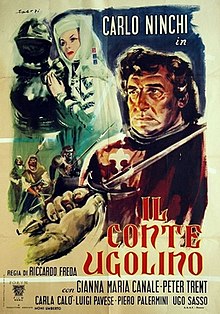
Sword-and-sandal, also known as peplum, is a subgenre of largely Italian-made historical, mythological, or biblical epics mostly set in the Greco-Roman antiquity or the Middle Ages. These films attempted to emulate the big-budget Hollywood historical epics of the time, such as Samson and Delilah (1949), Quo Vadis (1951), The Robe (1953), The Ten Commandments (1956), Ben-Hur (1959), Spartacus (1960), and Cleopatra (1963). These films dominated the Italian film industry from 1958 to 1965, eventually being replaced in 1965 by spaghetti Western and Eurospy films.

I Vampiri is a 1957 Italian horror film directed by Riccardo Freda and completed by the film's cinematographer, Mario Bava. It stars Gianna Maria Canale, Carlo D'Angelo and Dario Michaelis. The film is about a series of murders on young women who are found with their blood drained. The newspapers report on a killer known as the Vampire, which prompts young journalist Pierre Lantin to research the crimes. Lantin investigates the mysterious Du Grand family who lives in a castle occupied by Gisele Du Grand who is in love with Lantin. She lives with her aunt, who hides her face in a veil, as well as the scientist Julian Du Grand, who is trying to find the secret to eternal youth.

Carlo Ninchi was an Italian film actor. He appeared in more than 120 films between 1931 and 1963.
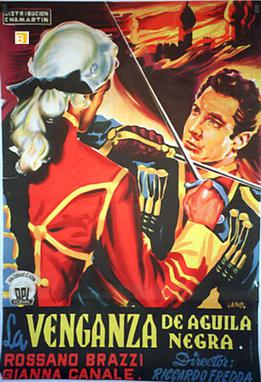
Revenge of Black Eagle is a 1951 Italian adventure film directed by Riccardo Freda. It is a sequel to Freda's 1946 film Black Eagle.
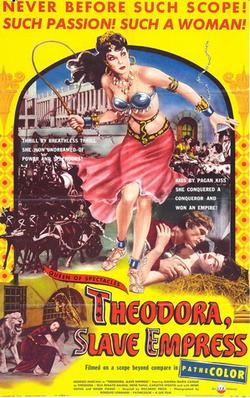
Theodora, Slave Empress is a 1954 film about Theodora, a former slave who married Justinian I, emperor of Byzantium in AD 527–565. It was directed by Riccardo Freda.

The Mysterious Rider is a 1948 Italian historical-adventure film directed by Riccardo Freda.

The Gay Swordsman is a 1950 Italian historical adventure film directed by Riccardo Freda and starring Carlo Ninchi, Gianna Maria Canale and Franca Marzi.

Guarany is a 1950 Italian film directed by Riccardo Freda and starring António Vilar, Mariella Lotti and Gianna Maria Canale.

See Naples and Die is a 1952 Italian crime-melodrama film directed by Riccardo Freda.

Sins of Rome is a 1953 historical drama film directed by Riccardo Freda and loosely based on the life story of Spartacus. The rights of film's negatives and copies were bought by the producers of Stanley Kubrick's 1960 film Spartacus, as to prevent eventual new releases of the film that could have damaged the commercial outcome of Kubrick’s film; this resulted in Sins of Rome's withdrawal from market for about thirty years.
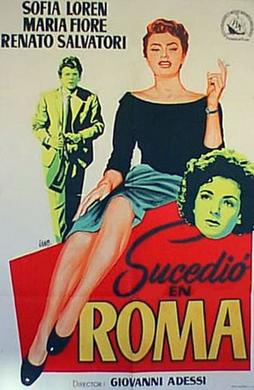
Good Folk's Sunday is a 1953 Italian comedy film directed by Anton Giulio Majano.
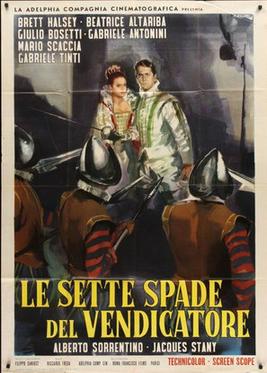
The Seventh Sword is a 1962 Italian-French adventure film directed by Riccardo Freda. It is a remake of Freda's debut film Don Cesare di Bazan.

The Magnificent Adventurer is a 1963 adventure film directed by Riccardo Freda. It is loosely based on real life events of Benvenuto Cellini.

L'eroe della strada is a 1948 Italian comedy film directed by Carlo Borghesio and starring Erminio Macario.
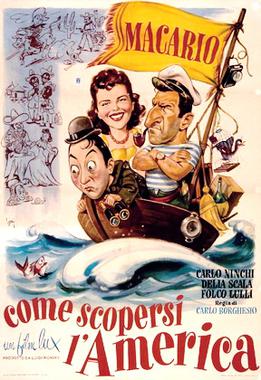
How I Discovered America is a 1949 Italian comedy film directed by Carlo Borghesio and starring Erminio Macario, Carlo Ninchi and Delia Scala.

The Avenger of Venice is a 1964 adventure film written and directed by Piero Pierotti and Carlo Campogalliani and starring Brett Halsey and Gianna Maria Canale. It is based on a novel by Michel Zevaco.

The Giants of Thessaly is a 1960 Italian-French adventure-fantasy film directed by Riccardo Freda. It is loosely based on the epic poem Argonautica by Apollonius Rhodius.

Trapped in Tangiers is a 1957 spy film directed by Riccardo Freda and starring Edmund Purdom.
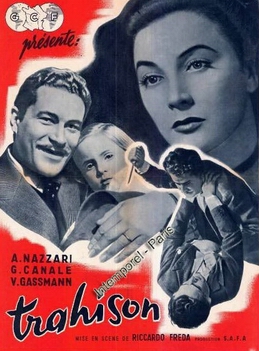
Double Cross is a 1951 Italian crime-melodrama film directed by Riccardo Freda and starring Amedeo Nazzari, Vittorio Gassman and Gianna Maria Canale.
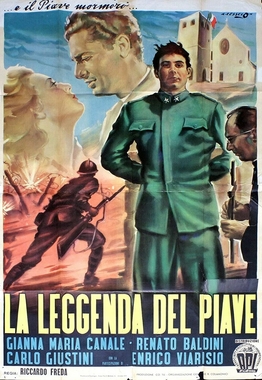
The Legend of the Piave is a 1952 Italian war melodrama film directed by Riccardo Freda and starring Gianna Maria Canale, Carlo Giustini and Renato Baldini. It takes its name from the 1918 patriotic song of the same name, although there is little connection between the song's lyrics and the plot of the film. It was filmed over four weeks, mostly at the Titanus Studios in Rome. The film's sets were designed by the art director Alfredo Montori.
